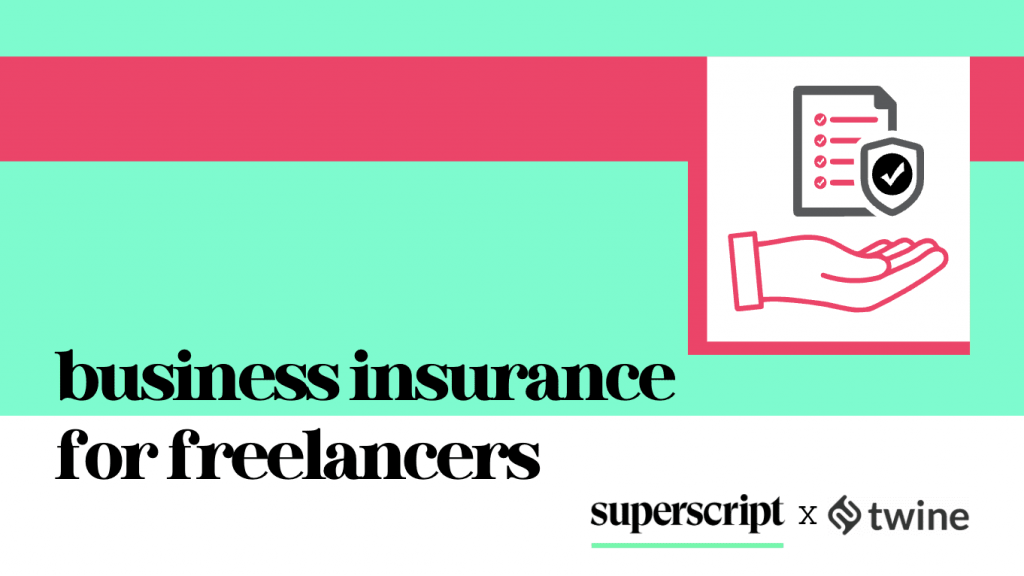
What is business insurance?
Business insurance protects you from the risks that come with running a business. Freelancers need it just as much as SMBs.
It’s your responsibility, as a freelancer, to prepare for risks. Although this might seem complicated or daunting, it doesn’t need to be.
This simple guide put together with Superscript, will help you get started.
Ready? Let’s dive in.
Do freelancers need business insurance?

Most freelancers don’t have a legal obligation to get business insurance. It is not usually associated with self-employment unless you hire someone else.
However, there are several good reasons to get covered:
Firstly, without business insurance, very few freelancers would be able to afford the cost of a claim. Usually, a claim is much higher than the price of insurance.
Secondly, some professional organizations require their members to get insurance.
Thirdly, some clients prefer to be insured. This is in case there are any particular risks that affect their working.
What does business insurance cover?

Business insurance is an umbrella term for a range of covers. Each cover applies to a specific set of risks, covering the cost of any claims made against you.
Professional indemnity insurance
Professional indemnity (PI) insurance protects you from risks like professional negligence, copyright infringement, defamation, unpaid client fees, and reputational damage.
For example, let’s say you accidentally commit copyright infringement by using someone else’s song or photo.
The original owner may decide to take legal action against you. If you have professional indemnity insurance, your insurer will cover any costs associated with this legal action. Neat, right?
Although PI insurance isn’t legally required, it’s considered a must-have for freelancers. It provides a professional service, handles client data, and works with intellectual property.
Many clients will only work with freelancers that have this cover, and you might need to get it in order to join certain regulatory bodies or professional organizations.
Business equipment insurance
Unlike employees, who are usually provided with everything they need to do their jobs, freelancers often need to cover the cost of essential business equipment.
Designers need to fork out for laptops and expensive software, while musicians know that instruments aren’t cheap. And if something were to happen to your equipment, the costs can quickly add up.
Business equipment insurance protects your essential kit from damage, loss, and theft. It then pays for it to be replaced or repaired.
Cyber insurance
Technology and computer systems are often considered essential. Unfortunately, whenever you use technology, you’re at risk of data breaches and cyber-attacks.
Cyber insurance protects you from these risks, covering legal fees, compensation claims, and costs related to notifying those affected. It could also provide cover for extortion, breaches of data protection laws, PR expenses, and financial loss resulting from system downtime.
For example, you primarily generate business through an online platform or website. Once your website is hacked, you will lose traffic and no longer reach clients.
Cyber insurance would cover losses caused by this downtime, as well as the cost of regaining access to the website.
Public liability insurance
Whenever you work with members of the public, there’s a chance that an accident could happen. Public liability insurance covers legal and compensation costs if your negligence causes injury or property damage to a third party (someone who isn’t an employee).
Because it’s relevant for anyone that works with third parties, public liability insurance is one of the most popular covers among freelancers and small businesses.
Employers’ liability insurance
Employers’ liability insurance covers legal and compensation costs that could occur if an employee gets sick or injured while they’re carrying out the actions the business asks of them.
Every employer has a responsibility to look after the health and well-being of their workforce. Whether their staff is full-time or temporary, employers are legally required to get employers’ liability insurance.
As most freelancers don’t have any employees, you’re likely to be exempt from this legal obligation. Even if you have one member of staff, you’ll need to get covered. If you don’t, you could be fined up to £2,500 per day.
How do I get the right business insurance?

The right insurance starts with the right cover, limits, and excess:
Cover
Business insurance policies combine different covers, and the covers you need depend on the risks you face. While some risks are shared by all freelancers, others are specific to particular industries or types of work.
It’s important to think about which risks you face, then make sure your policy has all the relevant covers.
Limits
A limit is the highest amount your insurer will pay if you need to make a claim. The different covers that make up an insurance policy usually have their own limits, so you’re likely to have multiple limits within one policy.
You’ll usually pay more for higher limits. If you need to choose a limit, you’ll need to ensure it’s suitable for the level of risk you’re likely to face.
Excess
When you make an insurance claim, you might need to pay something towards that claim. This is known as excess.
Covers with higher excess typically cost less, so you’ll need to find the right balance between your regular costs and the amount you can afford to pay in the event of a claim.
How do I choose an insurance provider?

Once you’ve settled on cover, limits, and excess, it’s time to choose an insurance provider. Some of the main factors to consider are customer reviews, customer support, and regulatory ratings:
Customer reviews
Checking out customer reviews can help you understand what an insurance provider does well. You’ll be able to find reviews on websites such as Facebook, Feefo, Google, and Trustpilot.
Customer support
Make sure you can get support in a way that works for you. For example, do you prefer live chat or phone support?
Regulatory ratings
Insurance is a heavily regulated industry, and a score of A or higher from A.M. Best, Lloyd’s, S&P, or Fitch suggests that the provider can be trusted.
Insurance for freelancers from Superscript

We’ve partnered with Superscript to give Twine freelancers access to easy, flexible business insurance.
Superscript supports freelancers and small businesses in over 1,000 industries, covering professional indemnity, business equipment, public liability, and much more.
Say goodbye to restrictive contracts and frustrating hidden fees – with Superscript’s subscription-based insurance, you’re free to cancel at any time.
To help you get started, Twine freelancers get two months’ free cover plus a year of free legal protection (T&Cs apply). Claim the offer and get a quote in less than 10 minutes.
Superscript is authorized and regulated by the Financial Conduct Authority.
Ready to get hired? At Twine, we have dozens of top-quality jobs being posted each and every day. From design to marketing, development to copywriting – there’s a job ready for your skills. Join the marketplace of diverse creative talent here.








